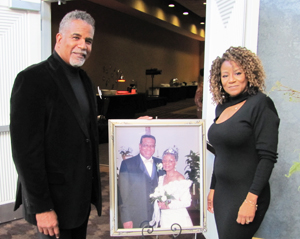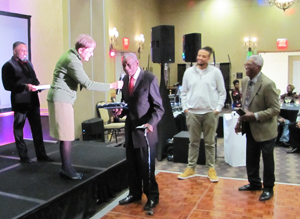
Special to The Truth
Family, friends and the staff of WJUC 107.3 FM celebrated the station’s 25th anniversary on Sunday, November 6 at the Hilton Garden Inn in Perrysburg and honored the man, the legend, Charles Welch, a/k/a Charlie Chuck, who founded the first Black-owned radio station in western Ohio a quarter century ago.
About 200 guests enjoyed dinner, entertainment by Lady K and Intuition, commemorative offerings to honor Welch by Congresswoman Marcy Kaptur and a video presentation of the work the man has done in this area.
The following are excerpts from a 2008 article in this paper written by Robert Smith of the African American Legacy Project and a broadcaster for The Juice.
“Charlie Chuck is more than a household name within the African-American community. He is truly one of this community’s favorite sons. Charlie Chuck’s true success can be measured in very basic terms. Simply, he has created a legacy for his children and grandchildren. To understand Chuck’s commitment to community you would have to know a little bit about his journey.
“During the late 1960’sToledo’s African-American community was alive and black businesses were thriving! Just up the road, Motown was jumping and a young man named W. Charles Welch was working weekends at WJLB radio, at the same time he was performing occasionally in nightclubs.
“His big baritone voice could excite a crowd. Yet, he had a family to support, so he took on a factory job at Chrysler Corporation to pay the bills. Then … his opportunity came! There was an opening in Toledo, Ohio. At WKLR 99.9 FM and Charlie Chuck became the morning voice of Kooler Radio! Along the way, he developed important relationships in the music industry.

“B.B. King, Etta James, Bobby Blue Bland, The Temptations, The O’Jays, James Brown, are among the many musical legends who performed in Toledo or a regular basis and … as soon as they hit town, they would call Charlie Chuck. These relationships would prove important, not just because the people he met were music icons, but because they were friends. He recognized their determination and their willingness to pursue their personal and professional goals, in spite of the odds.
“It was those personal conversations and experiences with dozens and dozens of legendary performers which helped Chuck under the importance of dedicating himself to one day owning his own business.
“Few people know the story of his humble Alabama beginnings, caddying at all-white golf clubs, experiencing all the indignities of a black man working a position of servitude in the South. His family didn’t have much, but they had pride. Not even Chuck could have imagined, during those days of overt southern segregation, he would one day own and manage and his own radio station but he will tell you, he always dreamed of a better life!
“His journey – not one so different from others wanting and achieving a better life – was filled with numerous roadblocks all along the way. After his long career with WKLR, where he served as music director, program director and ultimately station manager, Chuck went on to work in different markets including stint in Houston, Texas. Somewhere during that period, the idea of owning a radio station was born.
“Unfortunately, he still lacked the resources and, he still had to support a growing family. Not one to give up, Chuck – once again – commuted daily between Toledo and Detroit joining Barden Cable Company as their local sales manager.
“He is the first to tell you his journey was made a lot easier, because his wife Margie was there, doing what a wife and mother needed to do. She protected the children and, at the same time, held down a job at night. Together, they decided to make it!
“Perhaps, Welch’s desire to see Toledo’s African-American community flourish again has something to do with those humble beginnings. Maybe, it has something to do with the people he met along the way. Perhaps, he wants to show young people there is a way out. Perhaps, he sees his community in distress. Perhaps, it is all true! Welch sees a better Toledo, he sees hope for the African-American community. He could easily make the decision to set his life on cruise but as he says, ‘…there’s work to be done.’”






